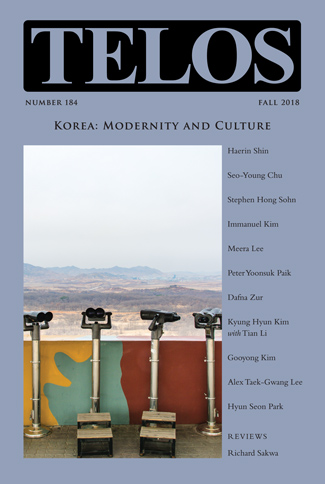Dafna Zur’s “You Can’t Write ‘Pak’ on Television: Language as Power in Hebrew K-pop Fandom” appears in Telos 184 (Fall 2018), a special issue on Korea. Read the full article at the Telos Online website, or purchase a print copy of the issue in our online store. Individual subscriptions to Telos are available in both print and online formats.
 Korean popular culture first arrived in Israel with the airing of Sweet Samsoon in 2007. What began as a cable channel’s cautious experiment with the tastes of a fan base accustomed to South American telenovelas turned into an unpredictably successful venture. Korean dramas have since appeared regularly both on cable TV and through fansub sites, delivering romantic comedies, action-packed adventures, and historical dramas to their fans. The reception of Korean pop culture in Israel challenges a traditional understanding of its reception around the world since Israel falls neither within the region that has facilitated Korean pop culture’s transnational circulation, nor have Israel and Korea enjoyed an extended political or economic exchange that would facilitate the reception of Korean cultural products. This article examines the consumption of Korean popular culture in Israel from an institutional perspective, as well as the perspective of its avid fans. Drawing on observations of changes in subtitle translations over time, on interviews with amateur Israeli subtitle translators (“fansubbers”), and on discourse analysis of the online interactions, this article looks to the interpretive and communicative power of subtitles and fansubs as proactive sites that respond creatively to the growing demand for, and familiarity with, Korean culture. It also points to the use of Korean “drama language” as a way for fans to build and reinforce an interactive, exclusive community with shared values and interests. The example of Israeli fandom contributes to our understanding of transnational cultural fandom within the broader global cultural economy.
Korean popular culture first arrived in Israel with the airing of Sweet Samsoon in 2007. What began as a cable channel’s cautious experiment with the tastes of a fan base accustomed to South American telenovelas turned into an unpredictably successful venture. Korean dramas have since appeared regularly both on cable TV and through fansub sites, delivering romantic comedies, action-packed adventures, and historical dramas to their fans. The reception of Korean pop culture in Israel challenges a traditional understanding of its reception around the world since Israel falls neither within the region that has facilitated Korean pop culture’s transnational circulation, nor have Israel and Korea enjoyed an extended political or economic exchange that would facilitate the reception of Korean cultural products. This article examines the consumption of Korean popular culture in Israel from an institutional perspective, as well as the perspective of its avid fans. Drawing on observations of changes in subtitle translations over time, on interviews with amateur Israeli subtitle translators (“fansubbers”), and on discourse analysis of the online interactions, this article looks to the interpretive and communicative power of subtitles and fansubs as proactive sites that respond creatively to the growing demand for, and familiarity with, Korean culture. It also points to the use of Korean “drama language” as a way for fans to build and reinforce an interactive, exclusive community with shared values and interests. The example of Israeli fandom contributes to our understanding of transnational cultural fandom within the broader global cultural economy.



